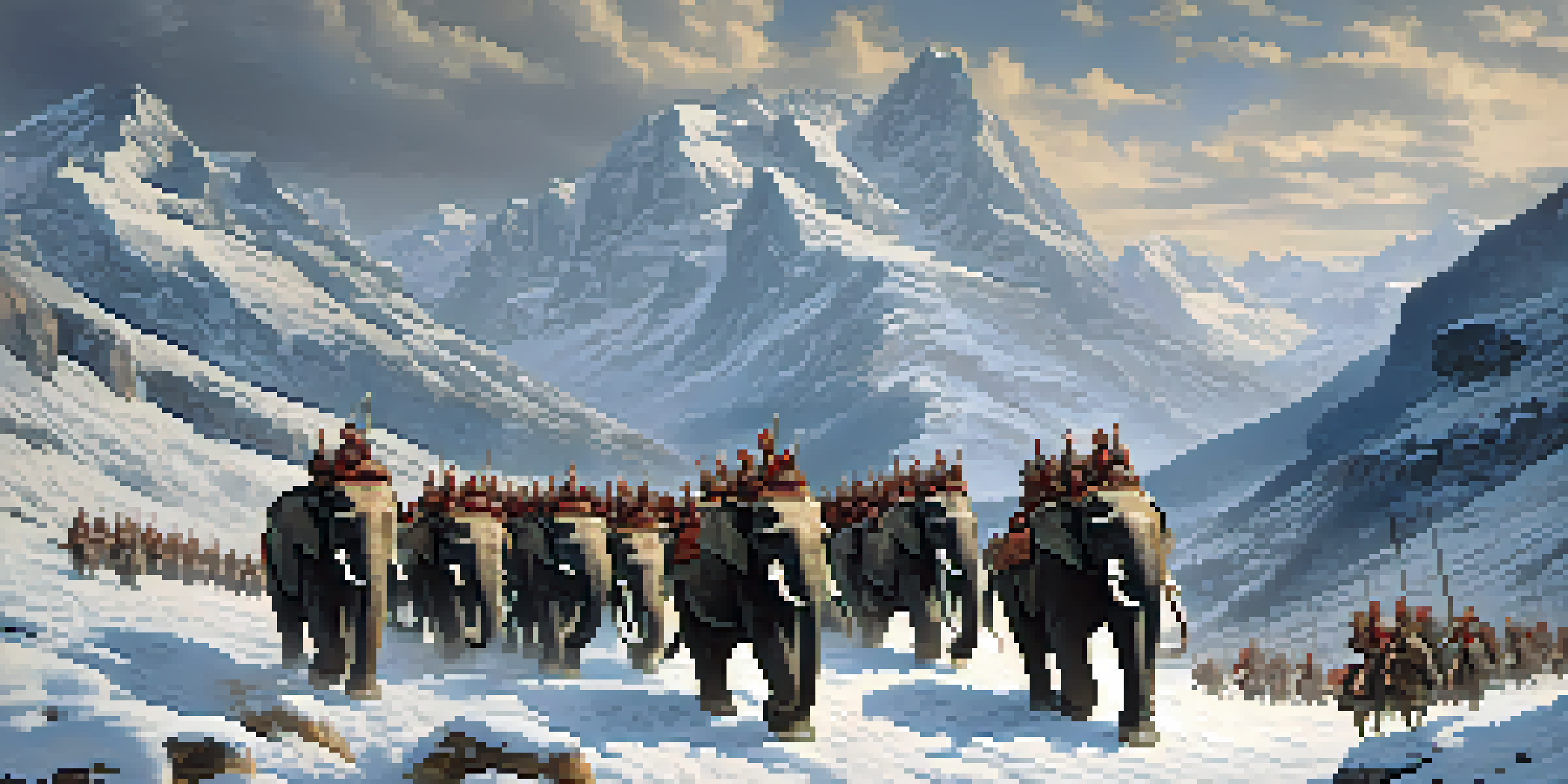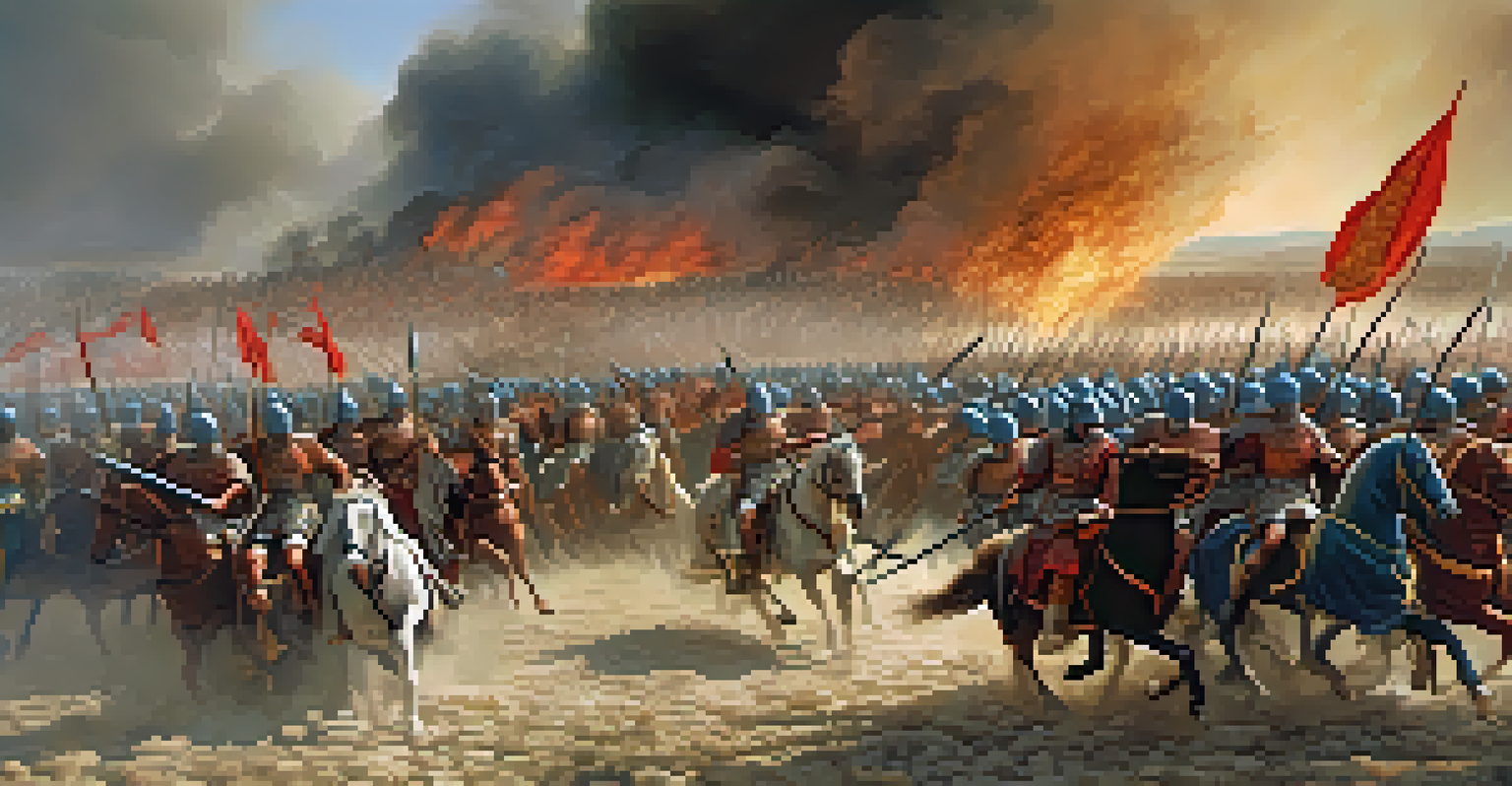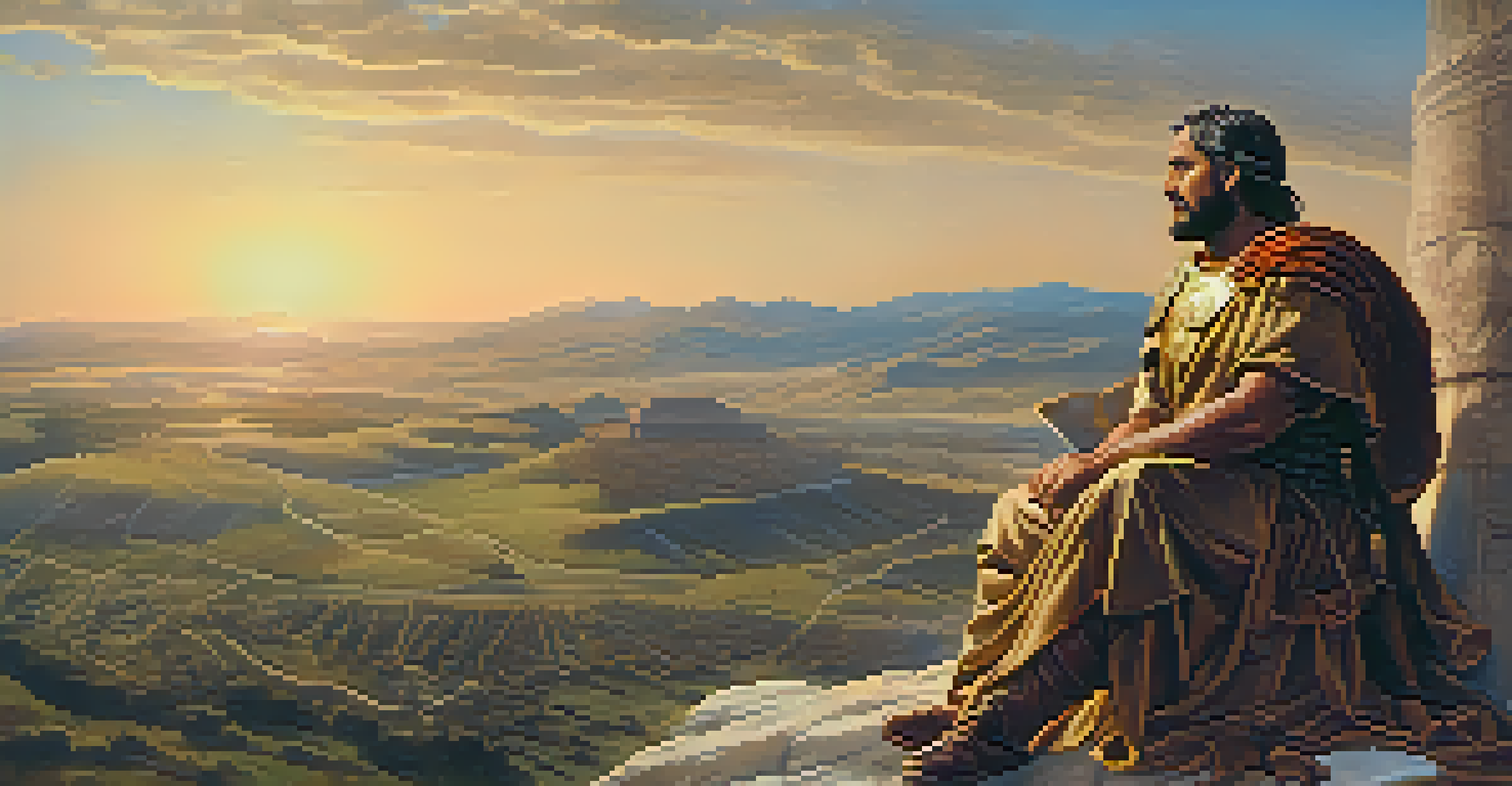Hannibal Barca: Military Genius and His Defense Techniques

Who Was Hannibal Barca? A Brief Introduction
Hannibal Barca, a Carthaginian general, is often hailed as one of history's greatest military minds. Born in 247 BC, he was the son of Hamilcar Barca, who instilled in him a deep hatred for Rome. This animosity towards the Roman Republic would shape his entire military career. His most famous campaign during the Second Punic War saw him crossing the Alps with an army that included war elephants, a feat that would become legendary.
In war, the moral is to the physical as three is to one.
What sets Hannibal apart from other military leaders is not just his audacity but his tactical brilliance. He consistently outmaneuvered larger Roman forces, demonstrating a unique ability to adapt to various battlefield conditions. His strategies have been studied for centuries, influencing military leaders and scholars alike. Hannibal's legacy is one that transcends time, showcasing the art of war in its most innovative form.
Understanding Hannibal's motivations and background provides insight into his military genius. His upbringing in a military family, combined with his experiences as a young commander, shaped his strategic thinking. This context is essential for grasping the nuances of his tactics and the defense techniques he employed during his campaigns.
Hannibal's Military Strategies: An Overview
Hannibal's military strategies were characterized by surprise, deception, and psychological warfare. He often employed tactics that played on the enemy's expectations, leading them into traps. For instance, his famous victory at the Battle of Cannae in 216 BC showcased his ability to encircle and annihilate a much larger Roman force, a maneuver that remains a classic example of tactical brilliance.

Moreover, Hannibal understood the importance of logistics in warfare. He ensured that his supply lines were secure while disrupting those of his enemies. This strategic foresight allowed him to maintain his army's strength despite being deep in enemy territory, which is a valuable lesson in military operations even today.
Hannibal's Tactical Brilliance
Hannibal Barca's innovative strategies, including surprise and deception, allowed him to consistently outmaneuver larger Roman forces.
In addition to his battlefield tactics, Hannibal's ability to inspire and lead his troops played a crucial role in his success. He fostered loyalty and morale within his ranks, ensuring that his soldiers were motivated to fight fiercely. This combination of tactical innovation and strong leadership defined Hannibal's approach to warfare.
The Role of Terrain in Hannibal's Defense Techniques
Hannibal was a master at utilizing terrain to his advantage, which greatly influenced his defensive strategies. He often chose battle sites that provided natural advantages, such as hills or narrow passes, allowing him to offset numerical disadvantages against larger Roman forces. This understanding of geography was key to his defensive success.
The greatest victory is that which requires no battle.
For example, at the Battle of Zama, Hannibal cleverly positioned his troops to exploit the terrain, even when facing the seasoned Roman general Scipio Africanus. By adapting to the landscape, Hannibal could create obstacles for the enemy while protecting his own forces. This adaptability is a crucial lesson for modern military strategists.
Moreover, Hannibal’s experience traversing various terrains throughout his campaigns taught him how to maneuver effectively. Whether it was the Alps or the Italian plains, he used the environment to bolster his defensive lines. This skill not only saved his troops from defeat but also exemplified the importance of terrain in military strategy.
Use of Deception in Hannibal's Tactics
Deception played a pivotal role in Hannibal's military tactics, often misleading his enemies to gain the upper hand. He was known for creating false impressions, such as feigned retreats, which would lure the Romans into vulnerable positions. This unexpected turn of events often resulted in catastrophic outcomes for his opponents.
One notable instance of this was during the Battle of Trebia, where Hannibal used the element of surprise to his advantage. By concealing his forces and employing ambush tactics, he was able to inflict heavy casualties on the Roman army. This level of strategic trickery highlights the significance of psychological elements in warfare.
Importance of Terrain in Warfare
Hannibal expertly utilized terrain advantages to bolster his defensive strategies, showcasing the critical role of geography in military success.
Hannibal's adept use of deception not only showcased his cunning but also instilled a sense of unpredictability in his campaigns. His ability to keep the enemy guessing created opportunities for victory, demonstrating how crucial the art of deception can be in a military context.
Hannibal's Adaptability: Key to His Defensive Success
One of Hannibal's defining traits was his remarkable adaptability in the face of changing circumstances. He often modified his strategies based on the situation on the ground, whether it involved troop movements or responding to enemy tactics. This flexibility allowed him to remain one step ahead of his Roman adversaries.
For instance, when faced with unexpected challenges, such as supply shortages or shifts in troop morale, Hannibal would reassess his strategy and make necessary adjustments. This proactive approach not only highlighted his tactical prowess but also ensured his forces remained cohesive and focused on their objectives.
This adaptability is a crucial lesson for modern military leaders and strategists. In an ever-evolving battlefield, the ability to pivot and respond to new information can be the difference between success and failure. Hannibal's legacy teaches us that rigid plans often lead to defeat, while flexibility can open doors to victory.
Lessons from Hannibal's Defensive Techniques
Hannibal's defensive techniques offer valuable insights that extend beyond military applications. Key lessons include the importance of thorough preparation, understanding the environment, and the element of surprise. These principles can be applied in various fields, from business strategy to personal development.
For example, preparing for potential challenges and adapting to new situations are vital skills in today's fast-paced world. Just as Hannibal meticulously planned his campaigns, individuals and organizations must anticipate obstacles and devise strategies to overcome them. This foresight can lead to success in any endeavor.
Lessons in Adaptability
Hannibal's remarkable adaptability in response to changing battlefield conditions offers timeless lessons in strategic flexibility and leadership.
Moreover, Hannibal's emphasis on morale and leadership highlights the significance of fostering a motivated team. By creating an environment where individuals feel valued and inspired, leaders can enhance productivity and collaboration. Thus, Hannibal's military genius transcends the battlefield, offering timeless lessons for all.
Conclusion: Hannibal's Enduring Legacy
Hannibal Barca's impact on military strategy and defense techniques is undeniable and continues to resonate today. His ability to adapt, deceive, and lead effectively has made him a subject of study for military leaders and historians alike. His campaigns not only changed the course of history but also reshaped our understanding of warfare.
The lessons drawn from Hannibal's strategies emphasize the importance of innovation, preparation, and adaptability in the face of adversity. As we analyze his tactics, we are reminded that the principles of leadership and strategy remain relevant across time and disciplines. Hannibal's legacy serves as a testament to the power of strategic thinking.

In conclusion, Hannibal Barca's military genius and defensive techniques not only secured him a place in history but also offer valuable insights for future generations. By embracing his lessons, we can enhance our own approaches to challenges in both military and everyday life.